| | | | | | | Presented By Babbel | | | | Axios World | | By Dave Lawler · Nov 07, 2022 | | Welcome back to Axios World. - We're focusing tonight (1,767 words, 6½ minutes) on a conflict that hasn't been on many front pages here in the U.S., but one that I wanted to devote some extra space to given the complexity.
- Apologies as I don't have a Where in the World for you tonight. It will be back on Thursday along with more coverage of COP27 and Ukraine.
| | | | | | 1 big thing: Rebel offensive in eastern Congo approaches key city | 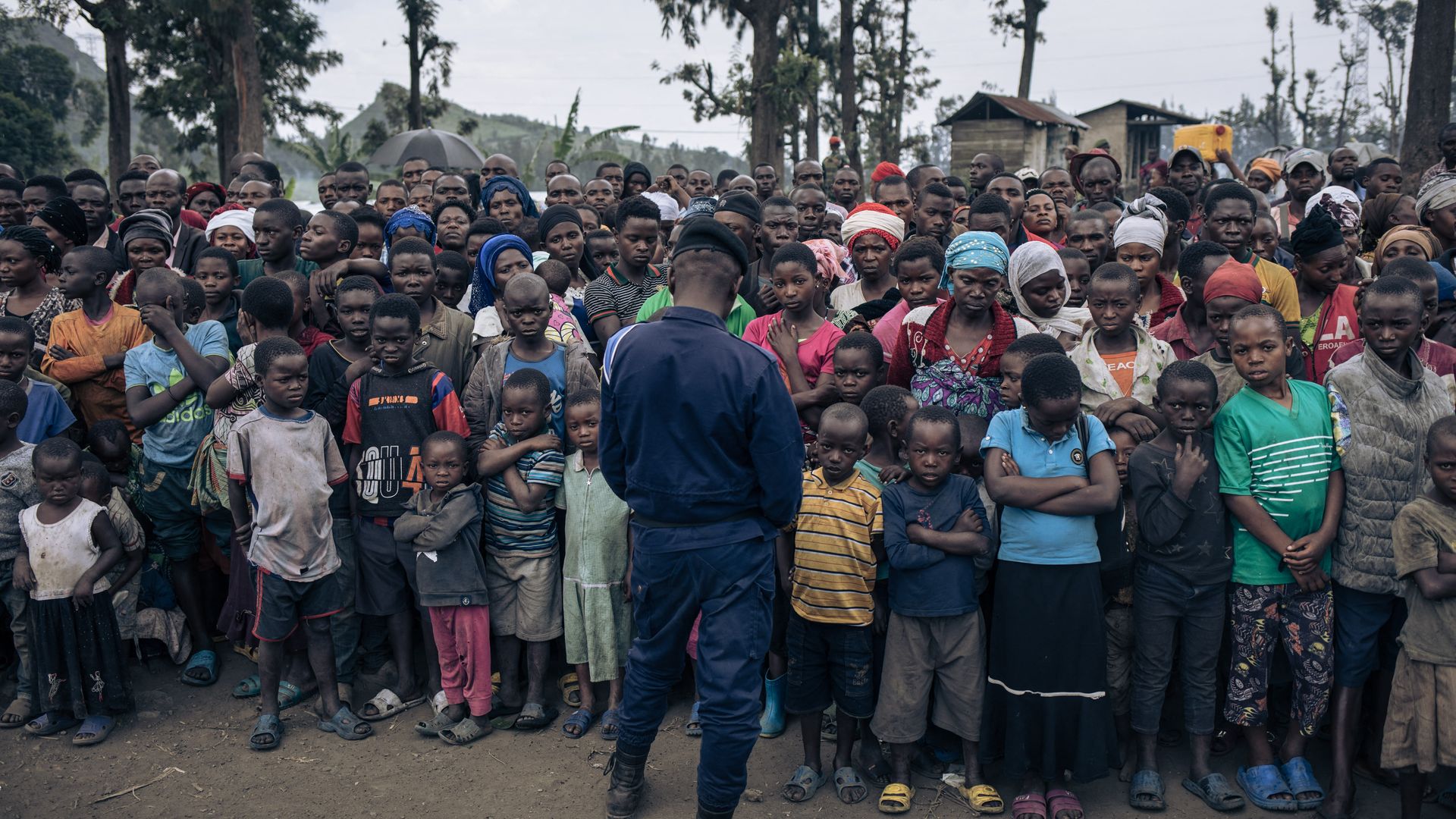 | | | People displaced by the M23 offensive at an informal camp in Goma. Photo: Alexis Hugeut/AFP via Getty Images | | | | As renewed rebel offensive in eastern Democratic Republic of Congo nears the largest city in the region, Kenya is sending in forces and the DRC and neighboring Rwanda are exchanging tense accusations. The big picture: Resource-rich parts of eastern DRC — more than a thousand miles from the capital, Kinshasa, and largely outside the government's control — have for decades been havens for illicit mining, proxy conflict, and rebel groups like the March 23 Movement (M23), which took control of several villages over the past two weeks. - The fighting this weekend came within 25 miles of Goma, a major city that sits on the DRC's border with Rwanda. One shopkeeper in Goma told AFP last week her children were refusing to go to school out of fear an assault could begin at any moment.
- Human Rights Watch estimates that 186,000 people have fled their homes since the spring due to the fighting. That number could swell quickly if it reaches Goma.
- The DRC accuses neighboring Rwanda of arming and supporting M23, as did a recent UN report. Rwanda denies that and accuses the DRC of harboring a Rwandan rebel group, the FDLR, that includes alleged perpetrators of Rwanda's 1994 genocide. Kinshasa denies that.
Zoom in: "Of course people are scared" that the violence will reach them, says a wildlife conservationist who lives outside Goma on the Rwandan side of the border. "But they don't have a choice. You have to wait and see what's going to happen." - We spoke on Monday shortly after Rwanda accused a DRC military plane of violating its airspace. While he said such reports alarm people along the border, he's less worried that war will break out between the two states than that the climate of hostility and proxy violence will spark further conflict within communities, between different tribes and ethnicities.
- "War in the Central Africa region has always been the hell of wars," says the wildlife conservationist, who declined to be named due to the sensitivity of the issue. Two brutal conflicts in Congo between 1996 and 2003 left millions of soldiers and civilians dead, as did the genocide in Rwanda.
The latest: The foreign ministers of the DRC and Rwanda re-committed to dialogue to de-escalate the crisis during an urgent meeting Saturday in Angola. But then came Monday's alleged airspace violation, which Kigali called a "provocation," but Kinshasa said was an accident. - Secretary of State Tony Blinken and French President Emmanuel Macron have both met with Rwandan President Paul Kagame and DRC President Felix Tshisekedi in hopes of lowering tensions, but Washington and Paris are playing supporting roles with leaders on the African continent taking the lead, a senior U.S. official tells Axios.
- Kenyan President William Ruto announced last week that his government was sending 900 troops to be based in Goma as part of a new East African regional force. Burundi and South Sudan say their troops will also take part, and Uganda already has forces in eastern DRC targeting an ISIS affiliate called ADF.
- The DRC is also seeking to recruit new soldiers to fight M23, and an army spokesperson claimed Monday that 2,000 had joined in Goma alone.
|     | | | | | | Part II: A region of guns and gold | 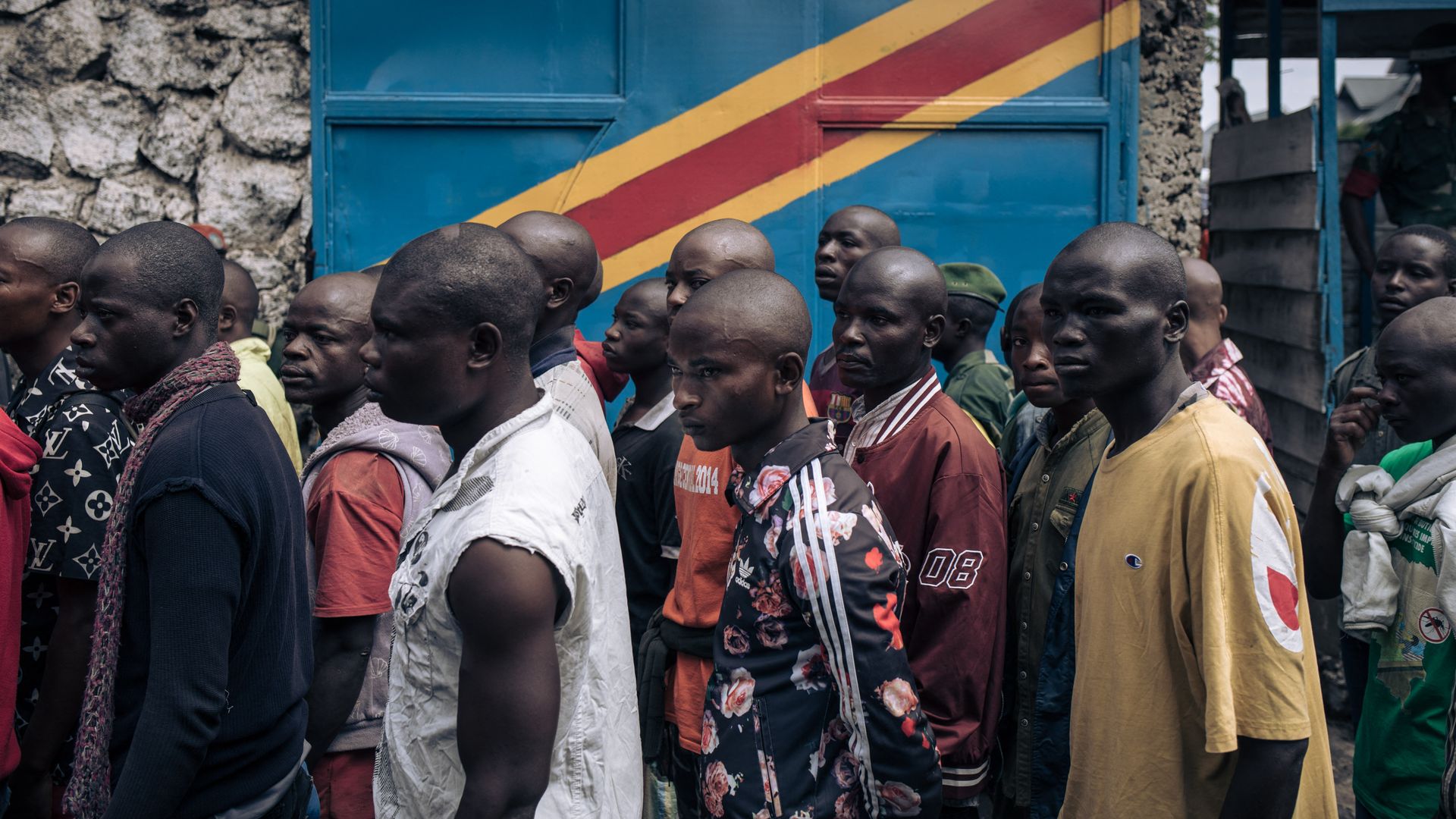 | | | A recruitment drive for the DRC military in Goma. Photo: Alexis Huguet/AFP via Getty Images | | | | The UN's peacekeeping mission in the DRC is the second-largest in the world but has faced fierce local resistance over its inability to protect communities. Driving the news: The day before Kenya's announcement, protesters in Goma set fire to UN vehicles. - While troops from Tanzania and South Africa were able to retake territory from M23 during an intervention in 2012, "the Kenyan force could get bogged down in many of the same difficulties the UN force has faced: difficulty making any progress on the ground, rapidly turning into a hostile reaction from the population," says Richard Moncrieff, an analyst with the International Crisis Group.
- It remains unclear whether or how the new regional mission will seek to collaborate with the larger UN force.
- A spokesperson for M23 said in a statement on Thursday that the group welcomed the Kenyan deployment and blamed the recent violence on the Congolese army. Rwanda offered to join the peacekeeping force, but the DRC objected.
Between the lines: Rwanda allows the M23 to operate along the Rwanda-DRC border "in a supportive environment with a safe back line," according to Moncrieff. - Like Rwanda, the group — which was formed in 2012 by mutinous Congolese soldiers — is led by ethnic Tutsis. Some powerful Rwandans also have commercial reasons for backing the rebels, Moncrieff says.
- Most of the gold mined in eastern DRC is smuggled out of the country, much of it to Rwanda and Uganda. Both countries deny any role in the illegal gold trade, though experts say both export far more gold than they produce domestically.
- The many rebel groups active in eastern Congo often exploit the region's mineral wealth in order to fund their operations.
State of play: It's unclear why M23 launched a major new push late last month after a relative lull in the violence. The group has previously accused Kinshasa of failing to implement a 2013 peace agreement. - The embassies of Rwanda and the DRC in Washington did not respond to requests for comment prior to publication.
|     | | | | | | Part III: A shared threat | 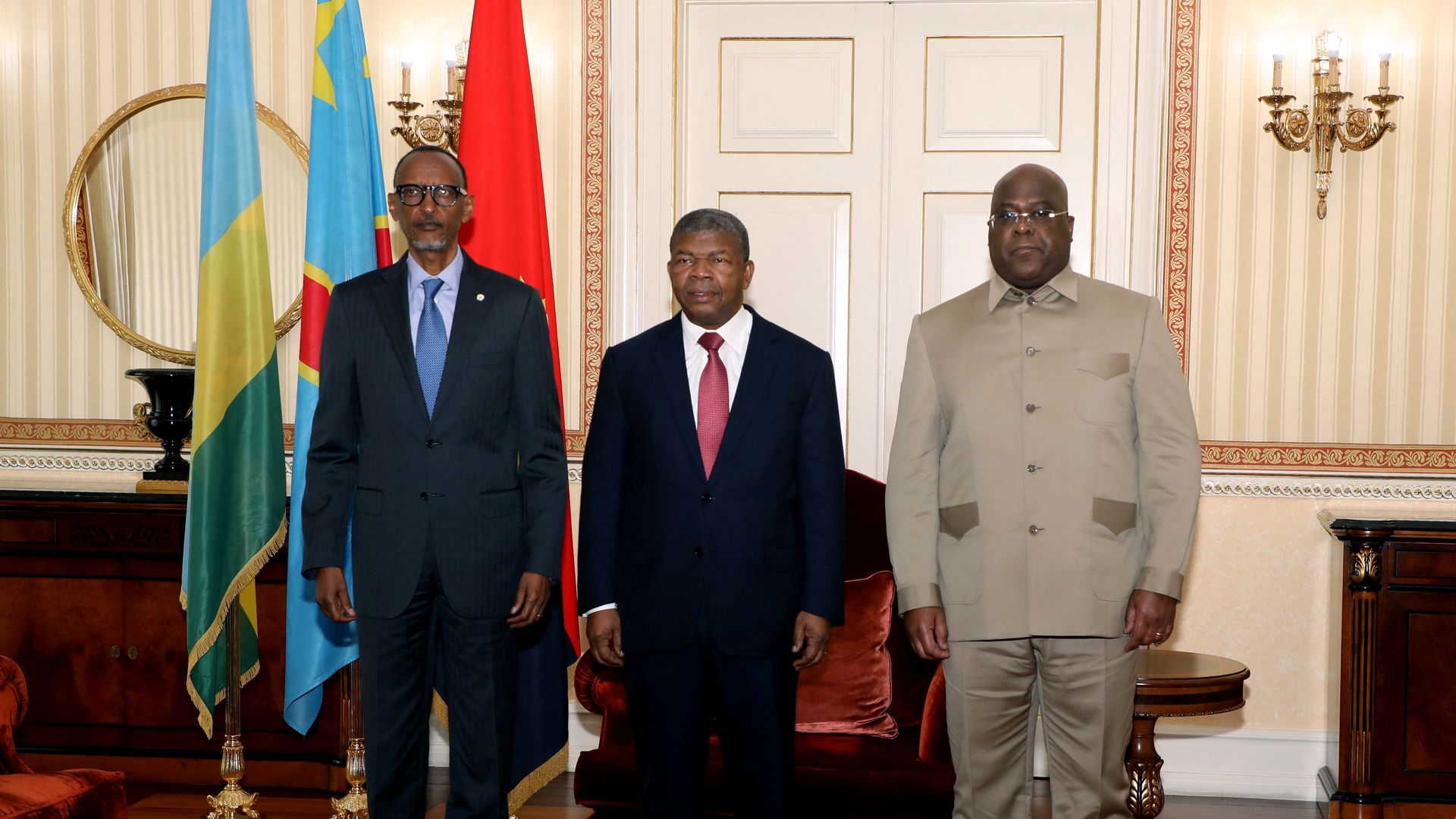 | | | Rwanda President Paul Kagame (L), Democratic Republic of Congo President Felix Tshisekedi (R) and Angola President Joao Lourenco attend talks in Luanda, Angola, in July. Photo: Jorge Nsimba/AFP via Getty Images | | | | While the land border between Rwanda and DRC is relatively short, it was one of the busiest in Africa in terms of daily crossings prior to the surge in violence this year. - "I used to cross on the weekends for a beer, but now I'm no longer doing it," says the Rwandan wildlife conservationist.
- Some of the many local businesses that relied on cross-border trade have shut down, he says.
What's next: While Rwandan and Congolese officials occasionally exchange allegations and harsh rhetoric, both sides say they're committed to dialogue. - Still, Moncrieff doesn't believe the political environment is ripe for a major agreement, particularly with Tshisekedi seeking re-election next year in a climate of anti-Rwanda sentiment. There were large anti-Rwanda protests one week ago in Goma.
Meanwhile, French officials have tried to convince Kigali and Kinshasa to focus on their shared threat from the ISIS affiliate ADF rather than fighting each other. - The ADF was founded in Uganda in the 1990s and pledged loyalty to ISIS in 2019. It has carried out a number of high-profile attacks in eastern DRC over the past several years.
- One French official told Axios that if the group is able to continue to gain strength it could become the "next Boko Haram," a reference to the extremist group that is based in Nigeria but has a presence across West Africa.
- While the wildlife conservationist outside Goma says ADF does pose a threat, "people aren't talking about it anymore. They're only focused on M23."
|     | | | | | | A message from Babbel | | Polish up your Polish — or 13 other languages | | |  | | | | Not only can you learn to say "dziękuję ci" ("thank you" in Polish!) with Babbel, but it also helps get your pronunciation right from the start. A language learning platform developed by 150 linguists, Babbel has lessons, exercises, videos and more. Speak a new language in as little as three weeks. | | | | | | 4. Four things to watch on Ukraine | 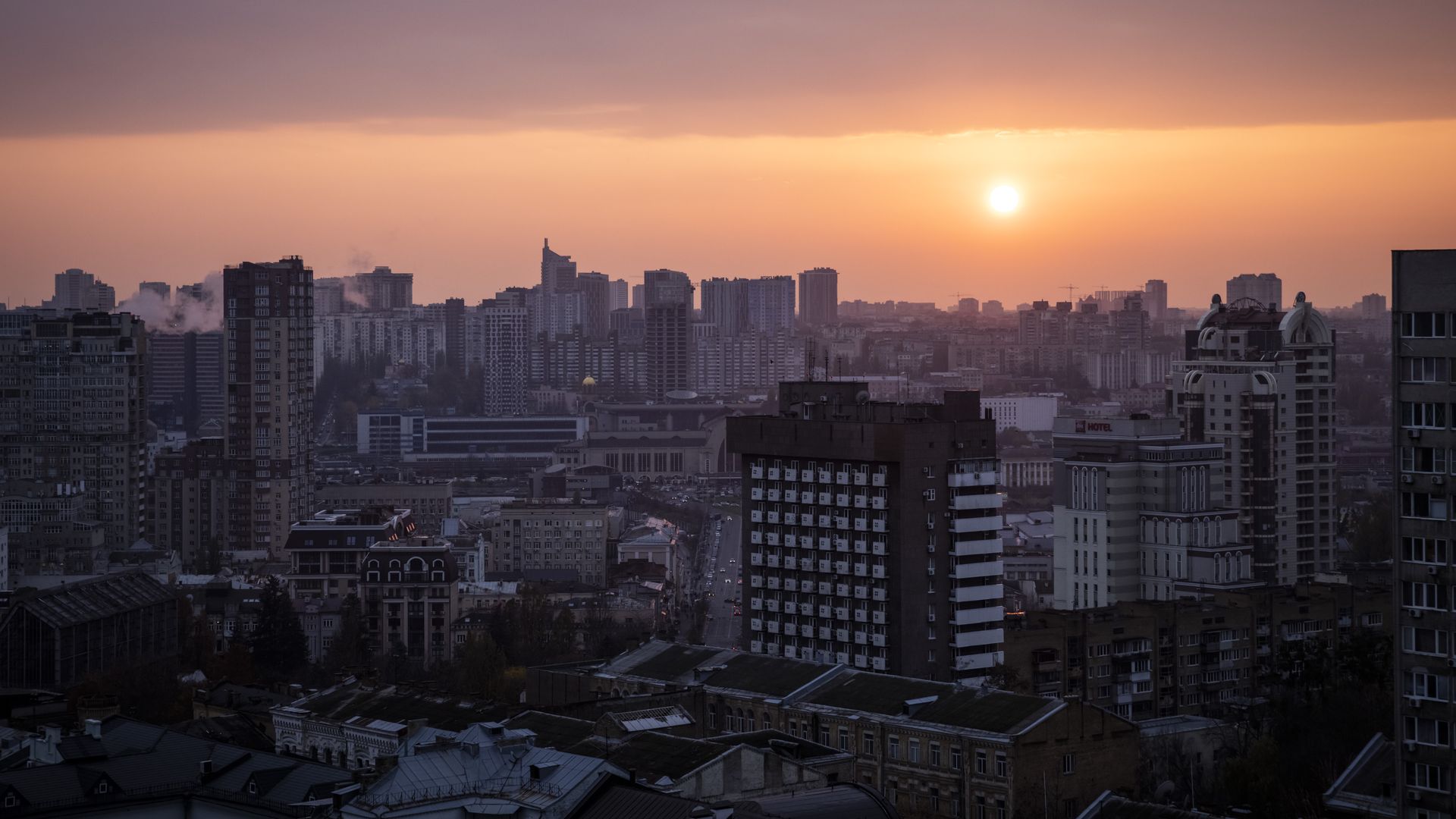 | | | The sun sets tonight in Kyiv, with many lights remaining off. Photo: Ed Ram/Getty Images | | | | Four pieces of Ukraine news that caught my attention over the weekend.. - "The Biden administration is privately encouraging Ukraine's leaders to signal an openness to negotiate with Russia and drop their public refusal to engage in peace talks unless President Vladimir Putin is removed from power," Washington Post reports.
- "President Biden's top national security adviser has engaged in recent months in confidential conversations with top aides to Russian President Vladimir Putin in an effort to reduce the risk of a broader conflict over Ukraine and warn Moscow against using nuclear or other weapons of mass destruction," WSJ reports.
- "Russian President Vladimir Putin publicly endorsed the evacuation of civilians from parts of Ukraine's southern Kherson region on Friday, the latest sign of Russia's retreat in one of the most bitterly contested areas in Ukraine," Reuters reports.
- "Ukraine's President Volodymyr Zelensky said about 4.5 million residents were temporarily without power on Thursday night due to Russian military attacks," Axios' Rebecca Falconer writes.
|     | | | | | | 5. Biden's new policy leaves Venezuelan migrants in limbo | 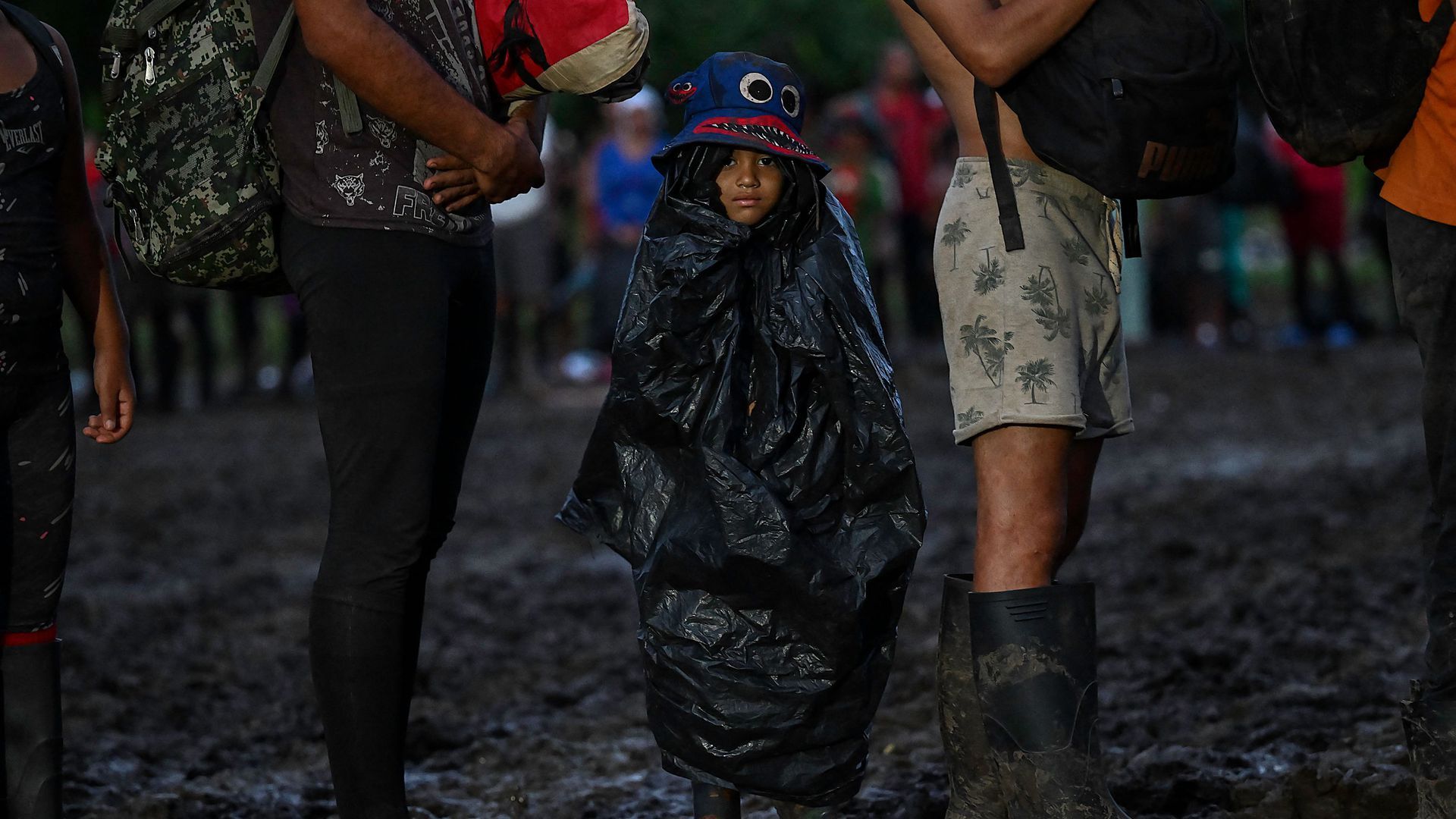 | | | Venezuelan migrants wait to be registered after crossing the Darién Gap into Panama. Photo: Luis Acosta/AFP via Getty Images | | | | A recent change in the Biden administration's immigration policy has left Venezuelan migrants and asylum seekers attempting to get to the U.S. in limbo, Axios fellow Liz Briceño Pazmiño writes. Why it matters: More than 7.1 million people have left Venezuela since 2015, largely due to the country's dire humanitarian crisis, according to the UN. Just this year, 150,000 Venezuelans have arrived at the southern U.S. border — four times as many as in the year prior. Zoom in: Elianny, 31, fled Venezuela in 2016 to Ecuador and then made that journey last year with her 2-year-old daughter. - "I had already prepared myself psychologically before traveling because I knew anything could happen, but deep down I knew I had to protect my baby," says Elianny.
- Along the way, Elianny says she saw people being robbed and girls being raped.
- The smugglers abandoned her, and Elianny acknowledges she's not sure what might have happened if not for the men who helped carry her daughter during difficult stretches. It took four grueling days to reach Panama, she says.
Zoom out: The Biden administration hopes that people fleeing Venezuela will now remain in neighboring countries rather than try to make that dangerous passage. - But the thousands of Venezuelans who had already begun the journey expecting refuge in the U.S. will now be turned away.
Read the full piece |     | | | | | | 6. Big tech in China: "The music is going to stop" |  | | | Illustration: Sarah Grillo/Axios | | | | The new round of U.S. efforts to slow China's access to semiconductor technology went further than many people expected, and the Biden administration isn't slowing down, Axios' Ina Fried writes. Why it matters: The tech industry once drove a wider movement to tie the world's economies together. Now it's becoming a victim of larger forces that are tearing them apart. - Experts say it's also a cautionary tale for companies that still have a big dependency on China, either as a market for their products or as part of their supply chain.
- "The music is going to stop at some point," Martijn Rasser, a senior fellow at the Center for a New American Security (CNAS), tells Axios. "Instead of one chair getting pulled out, it's going to be a lot of chairs."
- Read the piece
Worth noting: I'm currently reading "Chip War," a surprisingly fast-paced book about the semiconductor industry that I'd recommend if you want to get up to speed on the geopolitics here. |     | | | | | | 7. Stories we're watching | 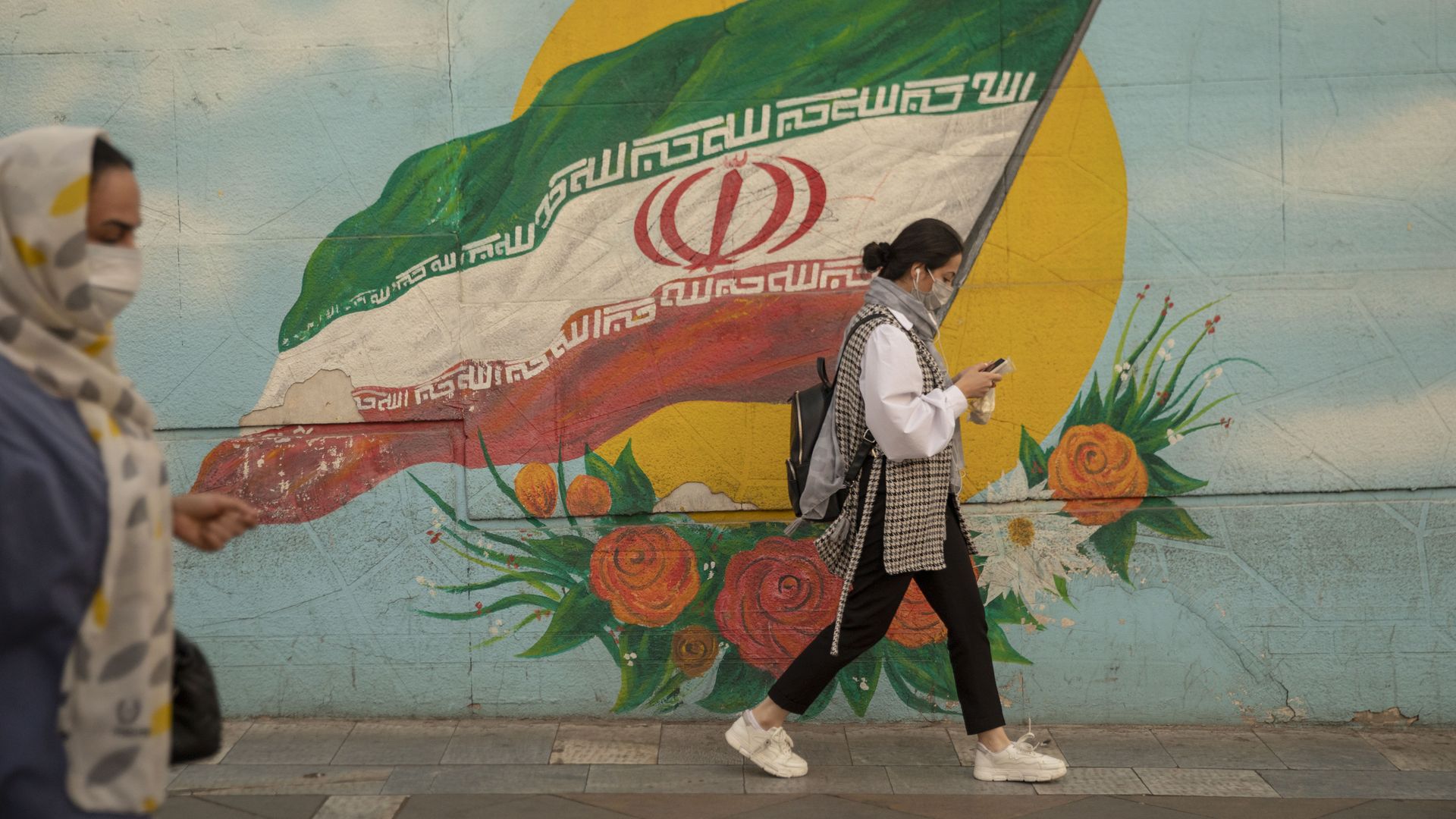 | | | A woman walks in Tehran without a mandatory headscarf. Photo: Contributor/Getty Images | | | - COP27 kicks off in Egypt
- Egypt faces food insecurity as it hosts climate summit
- Egypt's rights abuses and surveillance concerns loom over COP27
- North Korea's military claims missile tests were practice for attack
- Germany's Scholz raises Ukraine, human rights with Xi
- China's COVID restrictions hit Apple
- Biden congratulates Netanyahu
Quoted: "We have interfered, are interfering and will continue to interfere. Carefully, precisely, surgically and in our own way, as we know how." — Yevgeny Prigozhin, a Russian oligarch and businessman, speaking today about interfering in U.S. elections. |     | | | | | | A message from Babbel | | Say "ja" to learning a new language | | |  | | | | Babbel has what you need to learn how to hold real-world conversations in Dutch, Spanish and more. Learn through: - Expert-curated lessons.
- Speech technology that improves your accent.
- Context and cultural tips.
- Live online classes or videos.
Speak a new language in as little as three weeks. | | |  | | Are you a fan of this email format? It's called Smart Brevity®. Over 300 orgs use it — in a tool called Axios HQ — to drive productivity with clearer workplace communications. | | | | | | Axios thanks our partners for supporting our newsletters. If you're interested in advertising, learn more here.
Sponsorship has no influence on editorial content. Axios, 3100 Clarendon Blvd, Arlington VA 22201 | | | You received this email because you signed up for newsletters from Axios.
Change your preferences or unsubscribe here. | | | Was this email forwarded to you?
Sign up now to get Axios in your inbox. | | | | Follow Axios on social media:    | | | | | |
Post a Comment
0Comments